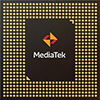
HiSilicon Kirin 820 5G Benchmark, Test and specs
Last updated:
The HiSilicon Kirin 820 5G is a 8 core processor. It can process 8 threads concurrently and is based on the 6. gen of the HiSilicon Kirin series. The processor was released in Q2/2019. The HiSilicon Kirin 820 5G scores 641 points with one CPU core in the Geekbench 5 benchmark. When using all CPU cores, the result is 2,429 points.

| Name: | HiSilicon Kirin 820 5G |
|---|---|
| Family: | HiSilicon Kirin (29) |
| CPU group: | HiSilicon Kirin 810/820 (3) |
| Architecture: | Cortex-A76 / Cortex-A55 |
| Segment: | Mobile |
| Generation: | 6 |
| Predecessor: | -- |
| Successor: | -- |
CPU Cores and Base Frequency
The 8 CPU cores of the HiSilicon Kirin 820 5G clock with 2.36 GHz. The number of CPU cores and the clock frequency of the processor are largely responsible for the overall performance.
| CPU Cores / Threads: | 8 / 8 |
|---|---|
| Core architecture: | hybrid (big.LITTLE) |
| A-Core: | 4x Cortex-A76 |
| B-Core: | 4x Cortex-A55 |
| Hyperthreading / SMT: | No |
|---|---|
| Overclocking: | No |
| A-Core Frequency: | 2.36 GHz |
| B-Core Frequency: | 1.84 GHz |
Artificial Intelligence and Machine Learning
Processors with the support of artificial intelligence (AI) and machine learning (ML) can process many calculations, especially audio, image and video processing, much faster than classic processors. Algorithms for ML improve their performance the more data they have collected via software. ML tasks can be processed up to 10,000 times faster than with a classic processor.
| AI hardware: | HUAWEI HiAI 2.0 |
|---|---|
| AI specifications: | Da Vinci Architecture. Ascend D110 Lite |
Internal Graphics
With the ARM Mali-G57 MP6, the HiSilicon Kirin 820 5G has an build in graphic solution. It has 6 SM processors, which have a total of 96 texture shaders. The iGPU not only enables games, but also significantly accelerates video playback.
| GPU name: | ARM Mali-G57 MP6 |
|---|---|
| GPU frequency: | 0.85 GHz |
| GPU (Turbo): | No turbo |
| Compute units: | 6 |
| Shader: | 96 |
| Hardware Raytracing: | No |
| Release date: | Q2/2020 |
| Max. displays: | 2 |
|---|---|
| Generation: | Vallhall 1 |
| Direct X: | 12 |
| Technology: | 7 nm |
| Max. GPU Memory: | 4 GB |
| Frame Generation: | No |
Hardware codec support
Processors that have an integrated graphics can play videos faster and more efficiently. This can have a positive effect on the battery life of notebooks, for example.
| h265 / HEVC (8 bit): | Decode / Encode |
|---|---|
| h265 / HEVC (10 bit): | Decode / Encode |
| h264: | Decode / Encode |
| VP8: | Decode / Encode |
| VP9: | Decode / Encode |
| AV1: | Decode |
|---|---|
| AVC: | Decode / Encode |
| VC-1: | Decode / Encode |
| JPEG: | Decode / Encode |
Memory & PCIeThe HiSilicon Kirin 820 5G supports up to memory in up to 4 (Quad Channel) memory channels. This results in a maximum memory bandwidth of --. |
|
| Memory type: | Memory bandwidth: |
|---|---|
| LPDDR4X-2133 | -- |
| Max. Memory: | |
| Memory channels: | 4 (Quad Channel) |
| ECC: | No |
| PCIe: | |
| PCIe Bandwidth: | -- |
Thermal ManagementWith the TDP, the processor manufacturer specifies the cooling solution required for the processor. The HiSilicon Kirin 820 5G has a TDP of 6 W. |
|
|---|---|
| TDP (PL1 / PBP): | 6 W |
| TDP (PL2): | -- |
| TDP up: | -- |
| TDP down: | -- |
| Tjunction max.: | -- |
Technical details
The HiSilicon Kirin 820 5G has a 2.00 MB large cache. The processor is manufactured in 7 nm. Modern production increases the efficiency of the processor.
| Technology: | 7 nm |
|---|---|
| Chip design: | Chiplet |
| Socket: | -- |
| L2-Cache: | -- |
| L3-Cache: | 2.00 MB |
| AES-NI: | No |
| Operating systems: | Android |
| Virtualization: | None |
|---|---|
| Instruction set (ISA): | Armv8-A (64 bit) |
| ISA extensions: | -- |
| Release date: | Q2/2019 |
| Release price: | -- |
| Part Number: | -- |
| Documents: | -- |
Rate this processor
Benchmark results

The benchmark results for the HiSilicon Kirin 820 5G have been carefully checked by us. We only publish benchmark results that have been created by us or that have been submitted by a visitor and then checked by a team member. All results are based on and fullfill our benchmark guidelines.
Geekbench 5, 64bit (Single-Core)
Geekbench 5 is a cross plattform benchmark that heavily uses the systems memory. A fast memory will push the result a lot. The single-core test only uses one CPU core, the amount of cores or hyperthreading ability doesn't count.

|
Intel Core i7-3537U
2C 4T @ 3.10 GHz |
||

|
Intel Core m5-6Y57
2C 4T @ 2.80 GHz |
||

|
Qualcomm Snapdragon 750G
8C 8T @ 2.20 GHz |
||
|
|
HiSilicon Kirin 820 5G
8C 8T @ 2.36 GHz |
||

|
Intel Core i7-990X
6C 12T @ 3.73 GHz |
||

|
Intel Pentium G3450T
2C 2T @ 2.90 GHz |
||

|
Intel Core i5-4310U
2C 4T @ 3.00 GHz |
||
Geekbench 5, 64bit (Multi-Core)
Geekbench 5 is a cross plattform benchmark that heavily uses the systems memory. A fast memory will push the result a lot. The multi-core test involves all CPU cores and taks a big advantage of hyperthreading.

|
MediaTek Dimensity 820
8C 8T @ 2.60 GHz |
||

|
AMD FX-8150
8C 8T @ 4.20 GHz |
||

|
MediaTek Dimensity 1000C
8C 8T @ 2.00 GHz |
||
|
|
HiSilicon Kirin 820 5G
8C 8T @ 2.36 GHz |
||

|
Intel Core i3-1115G4E
2C 4T @ 3.90 GHz |
||

|
Intel Core i5-4670T
4C 4T @ 2.80 GHz |
||

|
Intel Core i5-2500
4C 4T @ 3.30 GHz |
||
iGPU - FP32 Performance (Single-precision GFLOPS)
The theoretical computing performance of the internal graphics unit of the processor with simple accuracy (32 bit) in GFLOPS. GFLOPS indicates how many billion floating point operations the iGPU can perform per second.

|
Intel Core i9-11900
Intel UHD Graphics 750 @ 1.30 GHz |
||

|
Intel Core i9-11900K
Intel UHD Graphics 750 @ 1.30 GHz |
||

|
Intel Core i5-12450HX
Intel UHD Graphics 770 @ 1.30 GHz |
||
|
|
HiSilicon Kirin 820 5G
ARM Mali-G57 MP6 @ 0.85 GHz |
||
|
|
HiSilicon Kirin 820E 5G
ARM Mali-G57 MP6 @ 0.85 GHz |
||

|
AMD A10-6800K
AMD Radeon HD 8670D @ 0.84 GHz |
||

|
AMD A10-6790K
AMD Radeon HD 8670D @ 0.84 GHz |
||
AnTuTu 8 Benchmark
The AnTuTu 8 Benchmark measures the performance of a SoC. AnTuTu benchmarks the CPU, GPU, Memory as well as the UX (User Experience) by simulating browser and app usage. AnTuTu can benchmark any ARM CPU that runs under Android or iOS. Devices may not be directly compareable if the benchmark has been performed under different operating systems.
In the AnTuTu 8 benchmark, the single-core performance of a processor is only slightly weighted. The evaluation consists of the multi-core performance of the processor, the speed of the RAM and the performance of the internal graphics.
In the AnTuTu 8 benchmark, the single-core performance of a processor is only slightly weighted. The evaluation consists of the multi-core performance of the processor, the speed of the RAM and the performance of the internal graphics.
|
|
HiSilicon Kirin 985 5G
8C 8T @ 2.58 GHz |
||

|
MediaTek Kompanio 820
8C 8T @ 2.20 GHz |
||

|
Samsung Exynos 9820
8C 8T @ 2.70 GHz |
||
|
|
HiSilicon Kirin 820 5G
8C 8T @ 2.36 GHz |
||

|
Apple A10X Fusion
6C 6T @ 2.36 GHz |
||

|
Qualcomm Snapdragon 845
8C 8T @ 2.80 GHz |
||

|
Qualcomm Snapdragon 768G
8C 8T @ 2.80 GHz |
||
Benchmarks

Geekbench 5 (SC)
2,488 entries
2,488 entries

Geekbench 5 (MC)
2,461 entries
2,461 entries

FP32 SP (iGPU)
2,026 entries
2,026 entries

AnTuTu 8 Benchmark
118 entries
118 entries
Popular comparisons
back to index





